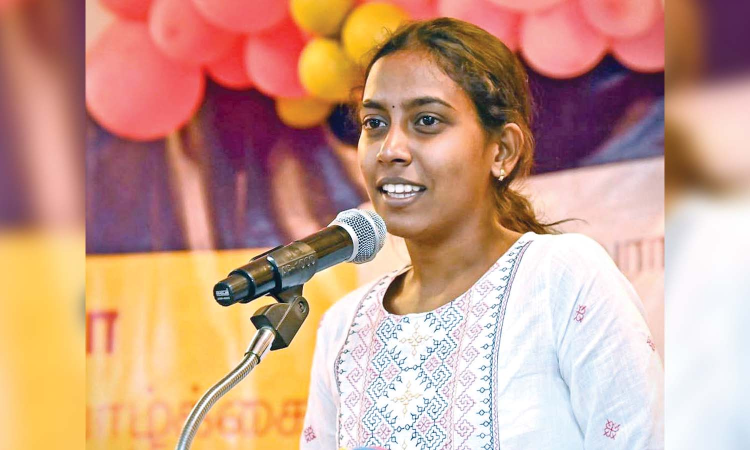Campus sans councils robs students of right to democracy, says SFI’s state chief Mridhula
In an interview, Mridula told DT Next about the need for a vibrant student union council to help students address academic and socio-political issues, challenge caste divisions, and resist irrational ideas in the education system

Mridhula S
CHENNAI: Moved by the suicide of medical aspirant Anitha, Mridhula S joined the Students’ Federation of India (SFI) in 2019 while in Class 12 and became active in anti-NEET protests. Now a 23-year-old sociology postgraduate, she has been elected as the first woman to hold the position of state president of the 55-year-old organisation.
In an interview, Mridula told DT Next about the need for a vibrant student union council to help students address academic and socio-political issues, challenge caste divisions, and resist irrational ideas in the education system. The absence of student councils, she argued, denies students a democratic space to question systemic flaws.
As the first woman state president of SFI, what challenges do you face?
I have seen many outspoken women in SFI with strong leadership qualities, but they were not as privileged as I was to continue in the organisation. So, it is undeniable that women still have to fight for their rights and face countless challenges to break free from the societal and family systems that continue to oppress them.
We have to make many sacrifices to be part of this movement. There are no monetary benefits. However, it allows you to function with complete freedom and to be your true self, unlike many other political parties, where women are often given positions only to be controlled by male family members.
What is your view on the non-conduct of student union or council elections in TN colleges, for nearly two decades.
It is an undemocratic and regressive approach followed by the government and the authorities. Although TN is considered one of the most progressive states, it is denying a democratic space for the student community. This robs students of the opportunity to come together to debate, discuss, and find solutions to campus-related issues. It also deprives them of their right to raise concerns about academic and institutional matters.
But there is a perception that student council elections lead to violence and disrupt the campus environment.
We have witnessed violence in local body polls, as well as in general elections for the Assembly and Parliament, on varying scales. Yet elections for these civic bodies, the Houses, haven’t been stopped, citing violence. Instead of using violence as an excuse to ban student elections (on campuses), we should be finding solutions to prevent it.
The JM Lyngdoh Committee submitted its recommendations for conducting student union elections, and the Supreme Court accepted them, directing their implementation in 2006. Except in Kerala, these recommendations have not been implemented, including progressive states like TN that once had strong student movements.
Students are stakeholders in educational institutions, yet they have no say in how these institutions operate. This is a denial of their rights enshrined in the Constitution. What we have been seeing is the criminalisation of student activism, and the police branded students hailing from poor socio-economic conditions in issues like ‘Route Thala.’
They are portrayed negatively, as if they are breeding grounds for trouble. What will they do when there is no opportunity to channelise their energy and groom their inherited talents? What will they do if they are denied cultural and other extracurricular activities? This approach is leading to a generation that is politically unaware, which will pose serious challenges to democracy. We are already seeing this in northern India, where the youth are being manipulated in the name of religion, instead of a rational approach.
But TN’s campuses are also riddled with caste-based violence and a growing caste divide among students.
This is one of the consequences of educational institutions not giving students the space to dismantle caste-based systems. Student organisations like SFI help bring together students from diverse socio-economic backgrounds. They work collectively and overcome caste and religious barriers.
In fact, comrades like Somasundaram and Sembulingam of the SFI succeeded in uniting students from different communities for a common cause in 1980. But they were murdered by casteist elements. By not reviving student councils, we are allowing these forces to pass on their caste-based hatred and prejudices to the next generation.
Are you saying the absence of student councils will have serious consequences for the student community?
Definitely, educational institutions are not just places for academics. They are spaces for individuals to explore themselves and engage with society, ultimately helping them grow into better individuals. Many prominent political leaders had their roots in student movements. They actively participated in socio-political issues, such as the anti-Hindi agitation in the 1960s. Such culture was vibrant until two decades ago. These experiences helped them develop leadership skills.
Now, students have no opportunity to work as a team, organise meetings, hold discussions and debates, protest, or promote democratic values. As a result, we are witnessing a decline in political awareness among the student community and a corresponding decrease in concern for social issues.
What’s your take on the issue of saffronisation of institutions?
Numerous incidents support this claim. People holding top and decision-making positions in premier institutions are making irrational and unscientific statements like “cow urine has antibodies,” undermining education and scientific temper. The NCERT has included unscientific and pro-right-wing ideas in the curriculum under the guise of content improvement.
For instance, they have added content about RSS leader Savarkar while undermining freedom fighters like Bhagat Singh. This must be challenged. Without a space for discourse on such issues within campuses, it will be difficult to resist the forces that are distorting the education system.



